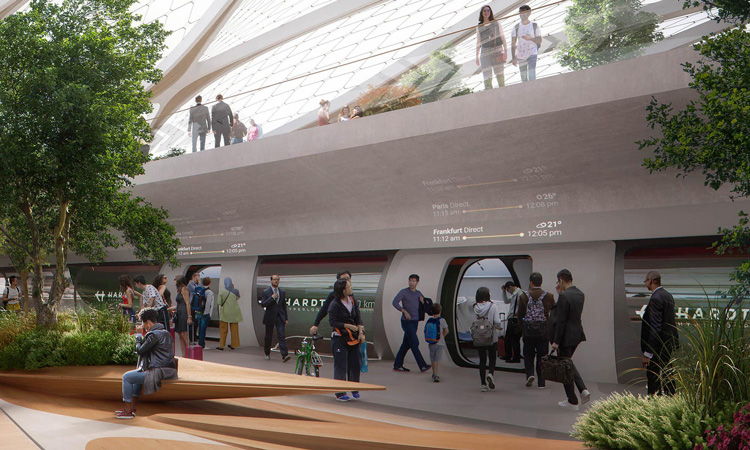Can a desire to travel more ever marry up with reducing carbon footprint?
- Like
- Digg
- Del
- Tumblr
- VKontakte
- Buffer
- Love This
- Odnoklassniki
- Meneame
- Blogger
- Amazon
- Yahoo Mail
- Gmail
- AOL
- Newsvine
- HackerNews
- Evernote
- MySpace
- Mail.ru
- Viadeo
- Line
- Comments
- Yummly
- SMS
- Viber
- Telegram
- Subscribe
- Skype
- Facebook Messenger
- Kakao
- LiveJournal
- Yammer
- Edgar
- Fintel
- Mix
- Instapaper
- Copy Link
Posted: 28 February 2020 | Tim Houter - Hardt Hyperloop | No comments yet
The ongoing discussion about how to truly achieve green and efficient travel continues. Here, Tim Houter, CEO of Hardt Hyperloop, gives his insight as to how hyperloop technology is a potential solution to the travel dilemmas we face today.


2019 was the year where flygskam or ‘flight shaming’ entered the public conversation. The role of personal actions to reduce our climate impact became more pronounced than ever before. But overnments across Europe have been playing their parts too, reducing emissions in electricity generation. Heat and transport however, are proving more difficult challenges to solve.
The turn of the decade presents the ideal opportunity to create new year’s resolutions that focus on reducing our carbon footprint. For some, the focus is dietary changes – reducing meat consumption or even opting for an entirely vegan diet. This isn’t new though; in 2019 800,0001 people gave up meat. This year however, climate change features as a much stronger reason for making the change.2
While there is no easy solution to longer journeys, hyperloop technology looks set to be a key player in future transport discussions
It’s not just food consumption where changes are being made. Travelling more frequently is often a goal, although people are becoming increasingly conscious of doing so sustainably. And a desire to travel more isn’t the only stress on the system – exponential population growth and a growing middle class in some parts of the world will only increase the number of journeys.
Some initiatives are already underway; Germany has reduced the cost of its long-distance train journeys by 10 per cent to make it a more attractive alternative. There’s a marked increase in electric vehicles3 – Germany overtook Norway for the most EV sales in 2019 and 130 million e-bikes are forecast to be sold in the next three years globally. The challenge comes when looking to travel further afield. Walking and cycling will never become the alternative to flying, so how can this challenge be overcome?
The hyperloop approach
One option could be through hyperloop technology. Travelling with the hyperloop is CO2 neutral and quicker than alternatives. From Amsterdam, it will take just 15 minutes to get to Eindhoven and 50 minutes to get to Frankfurt. The hyperloop has twice the capacity of current high-speed trains, which can allow for more passenger journeys as well as carrying more freight across continents.
However, we’re not there yet. The technology is still being developed with Hardt Hyperloop, one of the leading companies in the space, recently announcing that Groningen, Netherlands will be home to their upcoming test facility.


The race to rail
But Hardt Hyperloop, which is backed by EIT InnonEnergy, isn’t the only player in this space; there are about a dozen companies innovating with the technology. Elon Musk has a keen interest in hyperloop and launched an international competition for the best innovation – an accolade that Hardt Hyperloop won in 2017.
Since then, Hardt’s desire to reach commercialisation sees them seek out every opportunity to collaborate with other companies in the sector, learning and growing together to bring this new, exciting technology one step closer to reality.
Greener flights
Hyperloop technology will undoubtedly present a solution for sustainable, long-haul travel but it isn’t the only innovation taking place within the aviation sector.
Rolls Royce4 have just released the world’s fastest electric plane, but this technology remains in its infancy and flight durations for this type of technology remain relatively short.
Aviation bio-fuel faces a similar dilemma. As a technology, it is much more widely tested and accepted but scalability remains a concern. Bio-fuels are usually derived from two sources – waste or agricultural products. Waste bio-fuels remain in short supply, due to a lack of production facilities, and are unlikely to beat fossil fuels on price. Agricultural products naturally compete with farmland as a product which raises concerns on food shortages and wider sustainability around crop rotation.
While there is no easy solution to longer journeys, hyperloop technology looks set to be a key player in future transport discussions.
Whether your new year’s resolution is to reduce long distance travel or emissions related to travel this year, one thing is for certain, these goals will be easier to achieve as we progress through the 2020s and new technologies come online to enable greener, and faster travel.
References
3. https://europe.autonews.com/automakers/germany-passes-norway-ev-sales-lead








